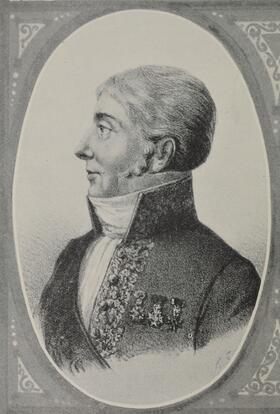Napoleon and music
Napoleon is generally said to have had little taste for music. However, to his credit, he organised a prosperous, eclectic artistic life in Paris.
Between 1800 and 1815, the French capital saw the opening of the Théâtre-Italien (1801), the creation of the Chapelle Consulaire and then the Chapelle Impériale (1802), the institution of the Prix de Rome for composition (1803), and the promulgation of numerous decrees aimed at subsidising and protecting the main theatres of the capital from overly frenetic competition (notably in 1807). Napoleon’s personal tastes leaned towards Italian music. He brought to Paris Giovanni Paisiello, whom he appointed master of his chapel, the singer Angelica Catalani, and later the castrato Crescentini, who delighted evening audiences at the Tuileries. He approved of Joséphine de Beauharnais’s interest in the composer Gaspare Spontini, who scored a huge success with La Vestale and then Fernand Cortez. But Napoleon was no less friendly to the composer Méhul and had a high regard for the professionalism of Jean-François Le Sueur. Above all, he understood perfectly well that music, and in particular opera, was a prime vehicle for political propaganda. Beyond certain personal passions (including for Ossianism, which undoubtedly led Le Sueur to write Ossian and Méhul to compose Uthal), he endeavoured to have edifying conquests represented on stage (in the image of his own), as in Méhul’s Adrien, Persuis’s Le Triomphe de Trajan or Cherubini’s Les Abencérages, and admitted – albeit reluctantly – that biblical subjects could also be used at the Opéra to moralise the crowds: Le Sueur’s La Mort d’Adam, Kreutzer’s La Mort d’Abel, Kalkbrenner’s Saül and La Prise de Jéricho, etc.
In the salons of Napoleon
Under the Empire, the great Parisian salons continued their musical activities begun under the Directoire and the Consulate: Ingres thus hosted quartet sessions every Friday in the Jardin des Capucines, while Sophie Gail welcomed the capital’s fashionable singers. The most brilliant of these salons was undoubtedly the Prince de Chimay’s, located in the Rue de Babylone, which brought together an orchestra composed of the most prominent Parisian virtuosos, including the violinists Kreutzer, Rode and Baillot, who sometimes played their own works. As for the Emperor, he organised private concerts in the Tuileries, notably on the occasion of his birthday, on 15 August. While these events tended to favour vocal music, Empress Josephine organised weekly concerts dedicated to chamber music at the Château de Malmaison, featuring the greatest Parisian artists around the harp of the Nadermann brothers and the horn of Frédéric Duvernoy. At the same time, in the homes of the great bourgeoisie, many amateurs, both men and women, took up playing the pianoforte.
Videos
Related persons
Related works
Mass for Napoleon's coronation
Giovanni PAISIELLO
Ossian ou Les Bardes
Jean-François LE SUEUR
/P. DERCY Jacques-Marie DESCHAMPS
Uthal
Étienne-Nicolas MÉHUL
/Jacques-Maximilien-Benjamin Bins de SAINT-VICTOR
Faniska
Luigi CHERUBINI
/Luigi CHERUBINI
Quintet with two violas in F major op. 92 no. 1
Antoine REICHA
Joseph
Étienne-Nicolas MÉHUL
/Alexandre DUVAL
L’ Auberge de Bagnères
Charles-Simon CATEL
/C. JALABERT
Les Rendez-vous bourgeois
Nicolò ISOUARD
/François-Benoît HOFFMAN
Gulistan ou Le Hulla de Samarcande
Nicolas DALAYRAC
/Auguste-Étienne-Xavier POISSON DE LA CHABEAUSSIÈRE Charles-Guillaume ÉTIENNE
Trio à cordes op. 5 no 2 en ut majeur
Alexandre-Pierre-François BOËLY
Sonate pour piano en ut majeur op. 1
Ferdinand HÉROLD
Symphony no. 5 unfinished
Étienne-Nicolas MÉHUL
Cendrillon
Nicolò ISOUARD
/Charles-Guillaume ÉTIENNE
La Mort d'Abel
Rodolphe KREUTZER
/François-Benoît HOFFMAN
Les Bayadères
Charles-Simon CATEL
/Étienne de JOUY
PIano Sonata no. 8 op. 5 no 2
Hélène de MONTGEROULT
Jean de Paris
François-Adrien BOIELDIEU
/Claude GODARD D'AUCOURT DE SAINT-JUST
Les Deux Jaloux
Sophie GAIL
/Jean-Baptiste-Charles VIAL
Les Abencérages ou L’Étendard de Grenade
Luigi CHERUBINI
/Étienne de JOUY
Scientific publications
Permalink
publication date : 20/10/23
Back to the list of Focus















